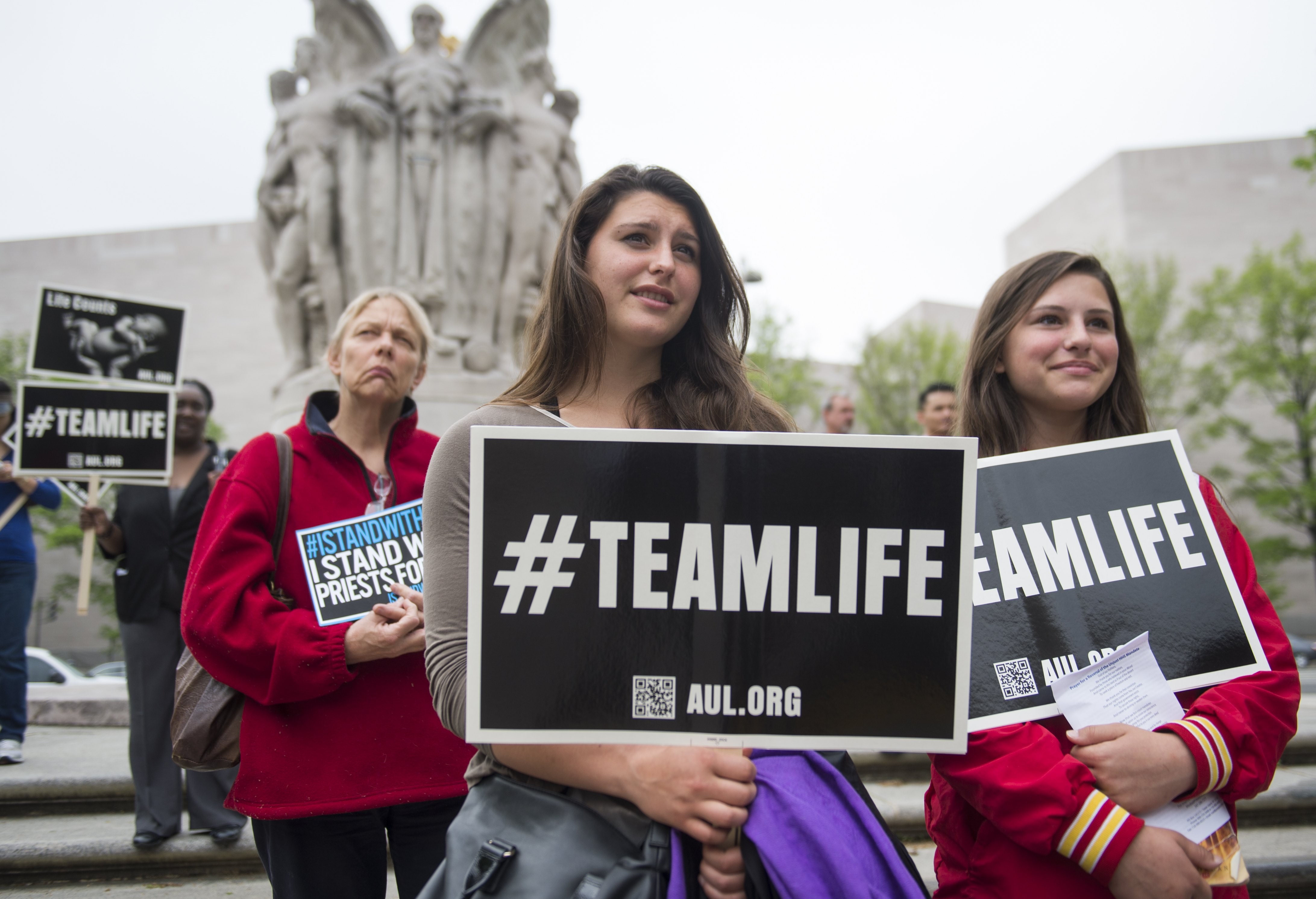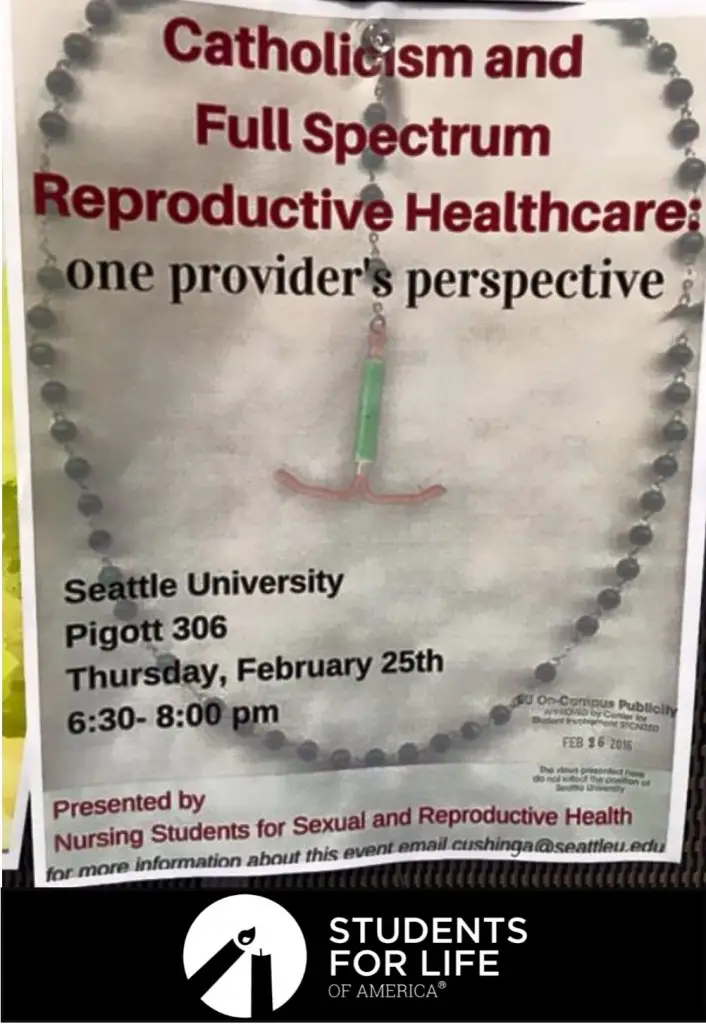How Religious Universities Stifle Student Voices
On religious campuses, what’s more important: the dogma of the school or the voices of the students?
By Jenna Ramsey, Seattle University
I’m a student at Seattle University, a small Jesuit Catholic college located in the city’s young, artsy Capitol Hill neighborhood.
It’s a liberal school in a liberal city. I can count the number of Republican students I’ve met here on my fingers. And although Seattle U is a religious university, Catholicism is often challenged on campus because of the conservative beliefs it’s associated with.
Last week, a group of nursing students planned to host an event on campus called “Catholicism and Full Spectrum Reproductive Healthcare: One Provider’s Perspective.” A healthcare provider from Planned Parenthood was supposed to give a talk about her experience growing up Catholic and how she does the work she does while maintaining her religious conviction.
But the flyer for the event—which depicted a Rosary with an IUD at the end of it instead of a crucifix—angered some students and faculty on campus, who argued that the image went against the school’s Catholic identity. I agree that it was a poor choice of design that was clearly trying to provoke a reaction, but the event itself sounded to me like a good idea.
The Students for Life (a national pro-life college student association) at Seattle U successfully lobbied for the school’s administration to postpone the event until the group that organized it came up with a way to bring an anti-contraceptive perspective to the discussion. A full description of the controversy is written—with an unnecessary attitude—here.
“By allowing events like this to happen and giving platforms to those who work daily against the teachings of the Church and the beliefs of a majority of Americans, it’s no wonder so many Catholic students leave their faith when they go to college,” said Kristan Hawkins, president of Students for Life of America, in response to what happened.
This is where the argument really loses me. If Catholic college students are losing their faith after they’ve heard an argument against it that they agree with, that’s probably better for them than continuing to follow a religion blindly. And if they don’t lose their faith in the religion after hearing it challenged, wouldn’t that mean they’ve gained a stronger hold on their beliefs?
It’s worth noting that the majority of students at Seattle U, myself included, don’t identify as Catholic. We’re here for the small class sizes, the urban location and the aspects of a “Jesuit education” that have less to do with religious beliefs and more to do with a holistic teaching style. It’s natural that those of us who don’t have ties with the Church (and even those of us who do) would have questions about the values it preaches.
After all, I’d been under the impression that questioning things is exactly what we’re supposed to be doing in college. Growing our minds, expanding our perspectives, listening to both sides of every argument—all that jazz.
It’s also worth noting that the Students for Life at my school have hosted multiple events on campus where just one perspective was presented: the pro-life perspective. And that’s fine, because not every college event has to be or should be a panel discussion. Just because the pro-lifers are a minority at my school doesn’t mean their opinions are any less valid.
But if that group is allowed to have someone come to campus to condemn abortion and Planned Parenthood, it should also be okay for a Planned Parenthood employee to share her perspective without having to fight with someone onstage.
One of the best things I’ve learned at college is that arguments can be healthy and rewarding when they’re done with respect. So it disappointed me to hear that this event, which seemed to be aimed at creating a dialogue about different ways Catholicism can be practiced and interpreted, was deemed too offensive to take place on campus.
I’m disappointed too with the fact that, in 2016, women’s reproductive healthcare is still treated as a taboo.
This country is in the middle of an argument about whether or not abortion procedures should still be legal. If the pro-life side wins that fight, but still says women shouldn’t be using contraceptives, what choice are we left with? It seems pretty extreme to tell us either don’t have sex, or be prepared to mother a child.
Whichever side of that argument you’re on, this is an important topic to discuss—especially on college campuses, since the issue directly affects people our age.
Of course it’s true that the Catholic Church is against the use of birth control, though Pope Francis recently said he believes using contraception could slow the spread of the Zika virus.
But you don’t necessarily have to agree with every political stance your religion takes in order to follow that religion, and I assume that’s one of the points the speaker at this event was going to make.
I understand why the administration and certain students at my school were upset by the image on the event flyer. It’s offensive and absolutely shouldn’t have been used. But shutting down the talk as a whole based on its advertisement took things too far—especially because the flyer had already been approved of before anyone got upset about it.
On the whole, my school does an impressive job of being inclusive of all ideas and hosting events that give light to controversial topics. But in my time here, I’ve seen how a university with religious ties can wind up stifling certain perspectives.
Can a Catholic school—or any religious university—allow that an event be held on campus if it opposes a belief of the school’s religion? The problem doesn’t have an easy solution.
But from my perspective, if that school is choosing to admit students who don’t identify with said religion, those students’ points of view should be fairly represented in campus dialogues.

















